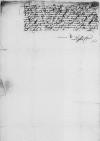Es sein mir etliche hendel angefallen(n), / in welchen ich denn(n) hochwirdig(en) Tiedemann Giese (Tidemannus Gisius) (*1480 – †1550), in 1519 ennobled by King Sigismund I; 1504-1538 Canon of Ermland (Warmia); 1516-1527, 1533-1537 Judicial Vicar and Vicar General of Ermland; 1523-1538 Custos of Ermland; 1537-1549 Bishop of Kulm (Chełmno); 1549-1550 Bishop of Ermland (BORAWSKA 1984, passim)⌊hern(n) zu ColmeseTiedemann Giese (Tidemannus Gisius) (*1480 – †1550), in 1519 ennobled by King Sigismund I; 1504-1538 Canon of Ermland (Warmia); 1516-1527, 1533-1537 Judicial Vicar and Vicar General of Ermland; 1523-1538 Custos of Ermland; 1537-1549 Bishop of Kulm (Chełmno); 1549-1550 Bishop of Ermland (BORAWSKA 1984, passim)⌋, / meinen(n) liebn(n) h(e)rn bruder, / durch meinen(n) kentczler(r) ersucht hab / in dem(m), was den(n) ausczog mit der legacion(n) betrifft. / Weil dan(n) solchs mit schrifft(en) nicht fueglich kan ausgericht werden(n), / ist mein freuntlich bit, Ew(e)r H(erlichkei)t wolde sich mit den ersten(n) hie her zu mir begeben(n), / mit der mich zu bereden(n), / uff welche zceit der ausczog mochte sein im bekuemssten(n), / den(n) illegible⌈[den(n)]den(n) illegible⌉ es ist nicht wenig daran(n) gelegen(n). Derwegen(n) wolte sich E(wer) H(erlichkei)t mit den erst(en) uff den weg zu mir machen, / die mir ein fast angenemer(r) gast wirt sein. / Gotlichn(n) gnad(en) in langweriger(r) gesuntheit befolenn(n).


 APG 300, 53, 269, p. 110
APG 300, 53, 269, p. 110